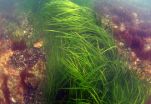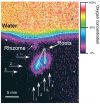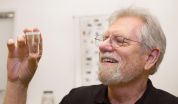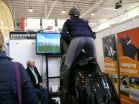(Press-News.org) Toxic is bad. Or is it? New studies of seagrasses reveal that they are surprisingly good at detoxifying themselves when growing in toxic seabed. But if seagrasses are stressed by their environment, they lose the ability and die. All over the world seagrasses are increasingly stressed and one factor contributing to this can be lack of detoxification.
Seagrass meadows grow along most of the world's coasts where they provide important habitats for a wide variety of life forms. However in many places seagrass meadows have been lost or seriously diminished and in several places, researchers and authorities work hard to understand what is happening and prevent the seagrasses from disappearing.
Now biologists from SDU add another important piece to the understanding of sea grass life.
It has long been known that the toxin sulphide is part of the threat to seagrasses. Sulphide is a naturally occurring toxin found in the seabed where seagrasses grows. The seabed is characterized by lack of oxygen and a smell of rotten eggs from sulphides.
A widely held theory states that seagrasses cannot tolerate sulphide and that increasing amounts of sulphide due to increased pollution have a negative effect on seagrasses.
Sulfide is absorbed by plant tissue
"But our research shows that seagrasses are actually capable of protecting themselves from sulphide. In fact, seagrasses benefits from sulphide", explains postdoc Harald Hasler-Sheetal who has conducted the research together with Professor Marianne Holmer, both from the Department of Biology, University of Southern Denmark.
The study shows that seagrasses are capable of protecting themselves against app. two thirds of the sulphide that enters the plant from toxic seabed. The last third is absorbed by the plant's tissue and here enzymes convert the sulphide into beneficial nutrients.
But the discovery that a seagrass can protect itself from sulfide does not mean that all is good.
"Seagrasses cannot tolerate sulphide under all circumstances. If a seagrass is stressed, the plant's capacity to detoxify itself will weaken, and the plant will be less capable of protecting itself from sulphide. It's like when humans are stressed; then we cannot perform optimally. Stressed seagrasses grow slower and may die back - this is what we see in many parts of the world", explains Harald Hasler-Sheetal.
Factors that may stress seagrasses, so it loses its natural ability to detoxify itself of sulphide include:
Unclear water: This blocks the sun's light, so seagrasses cannot produce enough oxygen to detoxify the sulphide.
Rising temperatures: If the water gets warmer, there is a greater risk of low oxygen in the water, which reduces seagrass' capacity to detoxify sulphide.
Discharge of nutrients: When fertilizers are washed from land into shallow coastal areas, many nutrients will be carried with the water. This stimulates blooms of phytoplankton, leading to shading and consumption of the oxygen in the water reducing the seagrasses capacity to detoxify sulphides.
How does seagrass detoxify itself?
Seagrass protects itself from sulphide in two ways: First it creates a shield around its roots so that sulphide cannot penetrate into the plant's interior. App. two thirds of the sulphide is being kept out this way. This shield consists of oxygen. The plant sends oxygen down to the roots and oxygen diffuse out of the roots. This oxygen shield can be maintained in daylight, where the plant produces oxygen via photosynthesis. At night oxygen is diffusing from the water to the roots. Part of the oxygen is also used to oxidize sulphide to sulfur, which the plant deposits as a harmless substance on the inside of air channels.
The last third of the sulphide is allowed to penetrate into the plant. This probably happens mainly at night, where the oxygen shield is smallest. Once inside the plant, enzymes convert the sulphide to useful nutrients for the plant.
If seagrass does not get enough oxygen, it cannot maintain these detoxification mechanisms.
Seagrass
Seagrasses are not seaweeds, but a plant with flowers, leaves and roots just like plants on land. Seagrasses also produces seeds that can be sown in the seabed and grow to new plants. There are approx. 60 seagrass species in the world with eelgrass (Zostera marina) in temperate areas as a common species. Seagrasses need light and only grows where at least 10% of the sun's light can reach the plants.
INFORMATION:
Ref: PLOS ONE: Sulfide Intrusion and Detoxification in the Seagrass Zostera marina. Harald Hasler-Sheetal, Marianne Holmer. DOI: 10.1371 / journal.pone.0129136 June 1, 2015.
Contact
Harald Hasler-Sheetal. hasler@biology.sdu.dk, tel +45 65508466 og +45 52525524.
Professor Marianne Holmer holmer@biology.sdu.dk, tel +45 60112605
Illustration
Eelgrass roots (blue) that are surrounded by oxygen shield (purple).
Increasing the number of female speakers at a scientific conference can be done relatively quickly by calling attention to gender disparities common to such meetings and getting more women involved in the conference planning process, suggests a Johns Hopkins Bloomberg School of Public Health researcher.
Reporting online Aug. 4 in the journal mBio, Arturo Casadevall, MD, PhD, professor and chair of the W. Harry Feinstone Department of Molecular Microbiology and Immunology at the Bloomberg School, lays out how the American Society of Microbiology General Meeting was able ...
COLUMBUS, Ohio - New mothers take a close look at their personal relationship with their husband or partner when deciding how much they want him involved in parenting, new research finds.
The study found that mothers limited the father's involvement in child-rearing when they perceived their couple relationship to be less stable. Mothers also limited fathers who were less confident in their own ability to raise children.
The bottom line is that new mothers are assessing their partners' suitability to be a parent, said Sarah Schoppe-Sullivan, co-author of the study and ...
When it comes to courting, one common spider species is quick to learn, and that learning process involves eavesdropping on the visual cues of rivals to win their mate. The latest discovery in a research partnership represented by Alma College, The Ohio State University at Newark and the University of Cincinnati is the featured article in the August issue of the international research journal Animal Behaviour.
Previous studies by the researchers explored how brush-legged wolf spiders (Schizocosa ocreata) used visual eavesdropping to try to outdo a male rival's leg-tapping ...
Cholera is a diarrhoeal disease that is caused by an intestinal bacterium, Vibrio cholerae. Recently an outbreak of cholera in Haiti brought public attention to this deadly disease. In this work, the goal of our differential equation model is to find an effective optimal vaccination strategy to minimize the disease related mortality and to reduce the associated costs. The effect of seasonality in pathogen transmission on vaccination strategies was investigated under several types of disease scenarios, including an endemic case and a new outbreak case. This model is an extension ...
WASHINGTON -- Chronic marijuana use by teenage boys does not appear to be linked to later physical or mental health issues such as depression, psychotic symptoms or asthma, according to a study published by the American Psychological Association.
Researchers from the University of Pittsburgh Medical Center and Rutgers University tracked 408 males from adolescence into their mid-30s for the study, which was published in Psychology of Addictive Behaviors.
"What we found was a little surprising," said lead researcher Jordan Bechtold, PhD, a psychology research fellow ...
HIV can continue to grow in patients who are thought to be responding well to treatment, according to research by the University of Liverpool.
During treatment for HIV the virus hides in blood cells that are responsible for the patient's immune response. The virus does this by inserting its own genetic information into the DNA of the blood cells, called CD4 Tlymphocytes.
The study by the University's Institute of Infection and Global Health measured the levels of integrated HIV in the CD4 cells of patients undergoing uninterrupted treatment for up to 14 years, and ...
A super-dense star formed in the aftermath of a supernova explosion is shooting out powerful jets of material into space, research suggests.
In a study published today, a team of scientists in the Australia and the Netherlands has discovered powerful jets blasting out of a double star system known as PSR J1023+0038.
It was previously thought that the only objects in the Universe capable of forming such powerful jets were black holes.
PSR J1023+0038 contains an extremely dense type of star astronomers call a neutron star, in a close orbit with another, more normal ...
Flight simulators for the training of air pilots are well known. But what about riding simulators? Although the first horse simulator was used at the French National Equestrian School in Saumur already in the 1980s, riding simulators for dressage, show jumping, polo or racing, have become available only recently. They look like horses and respond to the aids of the rider via sensors which measure the force exerted by the reins and the rider's legs. Via a screen in front of the simulator, the rider immerses himself into a virtual equestrian world.
Simulators are aimed ...
Scientists first had to re-think death before they could develop a way of testing the potential harm to the environment caused by thousands of chemicals humankind uses each day.
Researchers led by Dr Roman Ashauer, of the Environment Department at the University of York, refined the technique of survival analysis used routinely by toxicologists, biologists, medical researchers and engineers. The research could pave the way for testing the estimated 15,000 substances discovered daily.
Survival analysis which helps to predict a huge range of functions such as the survival ...
New research by scientists at New Zealand's University of Otago and GNS Science is helping to solve the puzzle of how bacteria are able to live in nutrient-starved environments. It is well-established that the majority of bacteria in soil ecosystems live in dormant states due to nutrient deprivation, but the metabolic strategies that enable their survival have not yet been shown.
The researchers took an extreme approach to resolving this enigma.
They studied a strain of acidobacteria named Pyrinomonas methylaliphatogenes that was cultivated from heated and acidic geothermal ...




